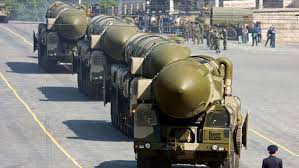On Thursday, one of Russian President Vladimir Putin’s closest supporters warned NATO that if Sweden and Finland joined the US-led military alliance, Russia would be forced to beef up its regional defenses, including by deploying nuclear weapons.
Finland and Sweden, which share a 1,300-kilometer (810-mile) border with Russia, are considering joining NATO. Finland will make a decision in the next weeks, according to Prime Minister Sanna Marin.
If Sweden and Finland join NATO, Russia’s land, naval, and air troops in the Baltic Sea will have to be strengthened, according to Dmitry Medvedev, deputy head of Russia’s Security Council.
Medvedev also clearly emphasized the nuclear threat, saying that any notion of a “nuclear-free” Baltic – where Russia’s Kaliningrad exclave is sandwiched between Poland and Lithuania – would be futile.
“There can be no more talk of the Baltic having a nuclear-free status; the balance must be restored,” stated Medvedev, who served as president from 2008 to 2012.
“Until now, Russia had not taken and would not take such actions,” Medvedev stated. “Take notice that it wasn’t us that offered this,” he added if his hand was pressed.
Lithuania claimed that Russia’s threats were not new and that Moscow had placed nuclear weapons in Kaliningrad long before the Ukraine conflict.
One of the most significant European strategic ramifications of the war in Ukraine would be the likely admission of Finland and Sweden to NATO, which was created in 1949 to ensure collective Western protection against the Soviet Union.
Finland declared independence from Russia in 1917 and fought two battles against it during World War II, losing some territory to Moscow in the process. Finland said on Thursday that forces from the United Kingdom, the United States, Latvia, and Estonia will take part in a military drill in Western Finland.
Sweden hasn’t fought a war in 200 years, and its postwar foreign policy has centered on promoting democracy, multilateral diplomacy, and nuclear disarmament around the world.
KALININGRAD
In the northern European theater, Kaliningrad is particularly important. It is less than 1400 kilometers from London and Paris, and 500 kilometers from Berlin, and was formerly the Prussian harbor of Koenigsberg, the capital of East Prussia.
In 2018, Russia announced the deployment of Iskander missiles to Kaliningrad, which was conquered by the Red Army in April 1945 and handed over to the Soviet Union at the Potsdam Conference.
The Iskander, also known by NATO as the SS-26 Stone, is a short-range tactical ballistic missile system capable of carrying both conventional and nuclear warheads.
It has a declared range of 500 kilometers, although some Western military sources believe it has a significantly longer range.
“No reasonable person wants greater costs and taxes, heightened border tensions, Iskanders, hypersonics, and nuclear weapons-carrying ships virtually at arm’s length from their own home,” Medvedev added.
“Let’s hope that our northern friends’ good sense prevails,” Medvedev remarked.
Russia had moved nuclear weapons to Kaliningrad even before the battle, according to Lithuanian Defense Minister Arvydas Anusauskas.
“Nuclear weapons have always been held in Kaliningrad,” Anusauskas was cited as saying by BNS. “The international communities, the countries in the region, are completely aware of this.” “It’s a threat to them.”
The Russian invasion of Ukraine on February 24 killed thousands of people, displaced millions, and fueled fears of a wider conflict between Russia and the United States, the world’s two biggest nuclear powers.
Putin claims that the “special military operation” in Ukraine is required because the US is using Ukraine to threaten Russia, and Moscow must protect itself against Ukraine’s persecution of Russian speakers.
Ukraine maintains it is battling an imperialistic territorial grab, and Putin’s allegations of genocide are false. Putin, according to US President Joe Biden, is a war criminal and a despot.
Putin sees the crisis in Ukraine as part of a larger conflict with the US, which he claims is attempting to maintain its hegemony even as its hold on the world order erodes.

















